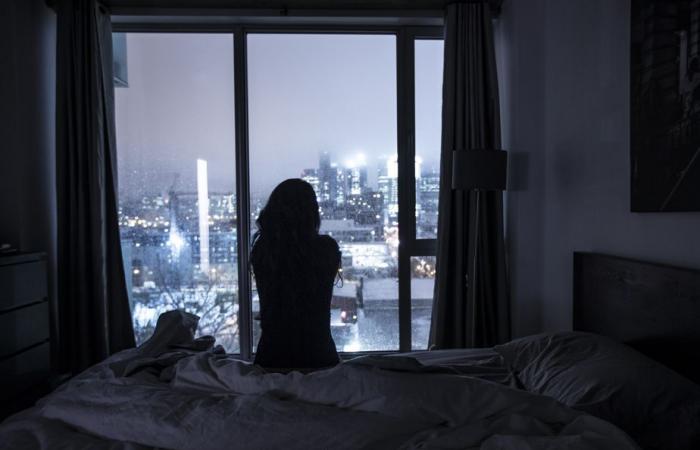More than one in seven Canadians use cannabis to sleep better, a new study reports. The proportion is even higher among young adults. But is it effective? Spotlight on the fight against insomnia.
Posted at 2:23 a.m.
Updated at 7:00 a.m.
Should I take cannabis if I have trouble sleeping?
It is not a lasting solution for insomnia. Cannabis helps you fall asleep initially, but if you take it regularly, you have to increase the dose so that the sleeping effect lasts, indicates Charles Morin, psychologist specializing in sleep at Laval University, who is also the author principal of the study published in the journal Sleep Medicine.
There are few studies on the effect of cannabis on sleep quality. We cannot therefore determine whether it harms the quality of sleep, like alcohol, specifies Mr. Morin. “But there are studies on the negative impact of cannabis on the mental health of young people. »
PHOTO PROVIDED BY CHARLES MORIN
Charles Morin, psychologist specializing in sleep at Laval University
Note: this is the first time that Mr. Morin has asked this question in his investigation into insomnia, which he has been conducting since 2007.
What about alcohol?
It is better to avoid having a small drink to fall asleep more easily.
“Alcohol reduces the quality of sleep in the second half of the night,” emphasizes Mr. Morin. This is the moment when we would consolidate the memory. So there are probably negative cognitive aspects to using alcohol before sleeping. »
Despite this, one in ten Canadians uses alcohol as a sleep aid, a proportion twice as high as in 2007.
What about sleeping pills?
Due to the problem of addiction, sleeping pills represent an unenviable solution to solving chronic insomnia.
“If you continue to take prescription sleeping pills for a long time, you may have addiction problems and need higher doses,” warns Mr. Morin.
Over-the-counter sleeping pills, such as melatonin or valerian, are potentially less dangerous, says Mr. Morin. But there is little evidence of their effectiveness. “Melatonin is known to help with some sleep problems in adolescents and also with jet lag, but that’s it. »
There is also a risk with natural products, which are much less regulated than pharmaceutical drugs. “They can contain contaminants,” says Mr. Morin.
Despite these problems, sleeping pills are becoming more and more popular. Since 2007, the proportion of Canadians using prescription sleeping pills has increased from 10% to 15%, and from 15% to 29% for over-the-counter ones.
How to fight insomnia, then?
The ideal is psychotherapy. “It works in 70% of cases, and in one in two cases, insomnia is resolved in the long term,” says Mr. Morin.
The psychotherapy set up by Mr. Morin, which lasts two to three months, has two components. The first is behavioral and aims to improve sleep habits. “If the patient feels like they are sleeping less than they should, say six hours rather than eight, we suggest they compress their night to six hours. Then, we increase by 20 minutes per day. You should also avoid screens or stressful activities before sleeping. »
The second is cognitive. “We work on ruminations, obsessions and concerns related to sleep,” explains Mr. Morin.
In a study published at the end of 2023 in the prestigious journal JAMA NetworkMr. Morin showed that psychotherapy is as effective as a prescription sleeping pill in curing insomnia and even further reduces anxiety related to insomnia.
But there are so few people who use psychotherapy for insomnia that Mr. Morin did not even include this question in his survey.
Can we apply certain psychotherapeutic approaches without psychotherapy?
Yes, thanks to a self-care guide developed by Mr. Morin and published by the site Dormez-là sur Canada.
We learn, for example, that it is better to limit naps to less than 20 minutes, avoid screens and too bright light before going to bed and go to bed only when you are tired.
Note, e-readers are not one of the screens to avoid before sleeping, because they have a filter for blue light, the most damaging.
Visit the Dormez-là sur ça Canada website
What does this new study change for me, who has insomnia?
It can calm certain insecurities.
Resorting to cannabis, alcohol or even prescription sleeping pills is not ideal for solving a problem of chronic insomnia, but many people resort to them. So there’s no point feeling guilty if you do it.
Furthermore, chronic insomnia problems (three times a week, for more than three months) affect one in seven Canadians. And a quarter of Canadians are dissatisfied with their sleep.
If you’re having trouble sleeping, then you’re not alone.
Learn more
-
- 3.4 times per week
- Frequency of use of prescription sleeping pills by those who take them
source : Sleep medicine
- 4 times a week
- Frequency of use of cannabis for sleep by those who take it
source : Sleep medicine
-
- 1,3
- Women suffer 1.3 times more from chronic insomnia than men
source : Sleep medicine







